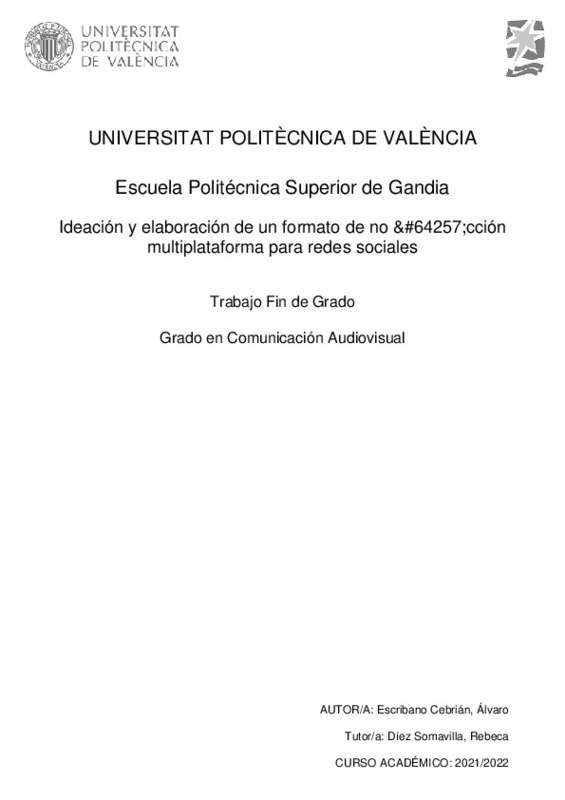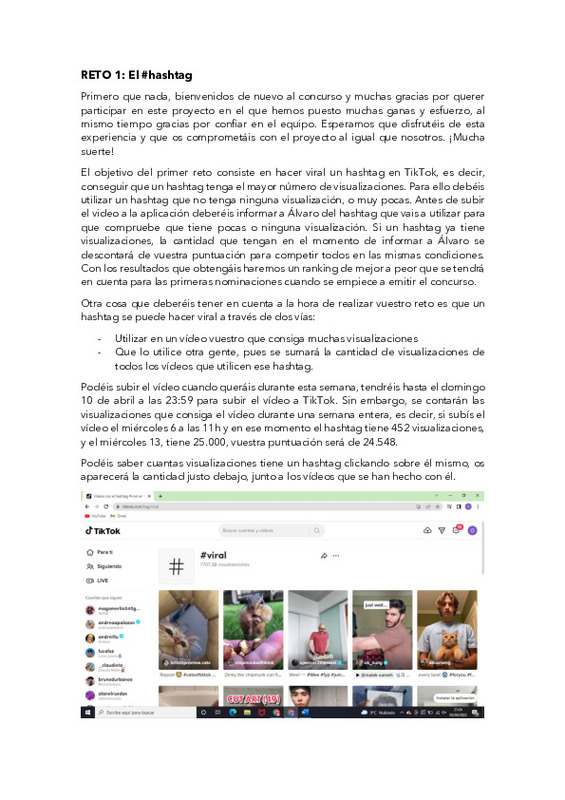|
Resumen:
|
[ES] Cada vez más los jóvenes se distancian de la televisión tradicional pues son más afines a consumir contenido audiovisual cuando ellos quieran, y no cuando se emita en un momento concreto. Por ello, plataformas VOD ...[+]
[ES] Cada vez más los jóvenes se distancian de la televisión tradicional pues son más afines a consumir contenido audiovisual cuando ellos quieran, y no cuando se emita en un momento concreto. Por ello, plataformas VOD como Netflix están teniendo tanto auge en los últimos años, donde además cada vez es más común encontrar formatos de no ficción, a pesar de que en un principio estas plataformas estaban destinadas a contenidos de ficción. Por otra parte, las redes sociales como TikTok también están reuniendo más tiempo de consumo entre los jóvenes que la televisión tradicional debido a que el contenido en redes es mucho más corto y consumible cuando el usuario desee. Sin embargo, y a diferencia de las plataformas VOD, en redes sociales no podemos encontrar formatos de no ficción. Es decir, nos encontramos ante un nicho de mercado todavía sin explorar. Por ello es que mi propuesta de TFG se basa en la ideación y elaboración de un formato de no ficción para redes sociales, concretamente un concurso en el que diez tiktokers o influencers subirán videos y realizarán retos semanales. El concurso se emitirá a través de una cuenta propia de TikTok y otra de Instagram, es decir, un formato multiplataforma, en las que se subirán contenidos periódicamente como estadísticas semanales y vlogs de los concursantes. Además, se importarán características de los realities televisivos, como nominaciones, expulsiones y vlogs a modo de confesionario donde se podrá conocer más profundamente a los concursantes. Para la emisión del programa se emplearán las diferentes herramientas de publicación de contenidos de las plataformas Instagram y TikTok de la forma más eficiente para conectar con el público y acercarles el formato. Concretamente, Instagram contará con la narrativa del concurso donde podremos ver la dinámica y estructura que sigue el formato, por otra parte, TikTok se empleará como catálogo de los concursantes donde poder ver sus perfiles y los retos que realizarán cada semana.
[-]
[EN] Increasingly, young people are distancing themselves from traditional television because they are more likely to consume audiovisual content when they want, and not when it is broadcast at a specific time. For this ...[+]
[EN] Increasingly, young people are distancing themselves from traditional television because they are more likely to consume audiovisual content when they want, and not when it is broadcast at a specific time. For this reason, VOD platforms such as Netflix have been booming in recent years, where it is also increasingly common to find non-fiction formats, despite the fact that initially these platforms were intended for fiction content. On the other hand, social networks like TikTok are also gathering more consumption time among young people than traditional television because the content on networks is much shorter and consumable when the user wants.
However, and unlike VOD platforms, we cannot find non-fiction formats on social networks. In other words, we are facing a market niche that has not yet been explored. That is why my TFG proposal is based on the ideation and elaboration of a non-fiction format for social networks, specifically a contest in which ten tiktokers or influencers will upload videos and perform weekly challenges. The contest will be broadcast through its own TikTok account and another Instagram account, that is, a multiplatform format, in which content will be uploaded periodically such as weekly statistics and vlogs of the contestants. In addition, characteristics of television reality shows will be imported, such as nominations, expulsions and vlogs as a confessional where the contestants can be known more deeply. For the broadcast of the program, the different content publication tools of the Instagram and TikTok platforms will be used in the most efficient way to connect with the public and bring the format closer to them. Specifically, Instagram will have the narrative of the contest where we can see the dynamics and structure that the format follows, on the other hand, TikTok will be used as a catalog of the contestants where you can see their profiles and the challenges they will perform each week.
[-]
|








